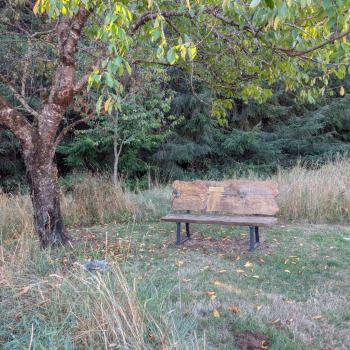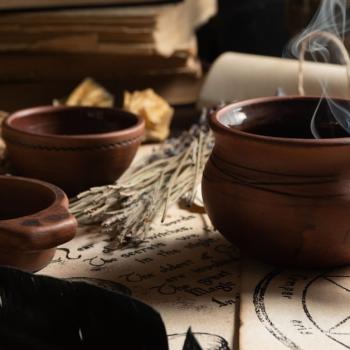
I’m not a big fan of surprise. I’ve developed a particular dislike of surprises in initiations.
I define initiation as a ritual that inducts the candidate into something new. In magical communities initiations connect the candidate with a group or an organization. They can also impart an energy. For example Tantric initiations can unlock the energy of a particular mantra.
Somehow we’ve developed the idea that an initiation has to be a surprise to be effective. We shouldn’t know what’s going to happen before it does. But why? We might blame the Eleusinian Mysteries. Candidates were sworn not to reveal what they learned to anyone who had not participated in the mysteries. These secrets (“things were said, things were shown, things were done”) were revelations leading to a joyful certainty. The revelation of a mystery lands with awe. It seems inevitable, as if we have always known it. Mysteries expose us to the luminousness of the sacred.
Secret and mystery are not synonymous with surprise.
The mysteries involved witnessing something sacred. Initiations today can include being introduced to deities, learning secret names and words, and meeting other initiates who are not public about their initiations. All these are legitimate reasons for secrecy.
Surprise on the other hand is something that’s done to the candidate without warning. These kinds of actions are very rarely pleasant or welcome. Some initiatory surprises are actively harmful to the magick. Processing the aftermath of a violent surprise can actively interfere with assimilating the energy of the initiation.
Surprise Doesn’t Equal Happy
When a surprise reveals a welcome gift it’s marvelous to watch the joy rise up in the person’s face. Is this for me? I love this! Culturally we emphasize this rather a lot. Surprise Christmas gifts. Surprise birthday parties. Surprise marriage proposals. Social media has exacerbated this – a marriage proposal can go viral.
One problem is that the surprise is not always welcome. Public marriage proposals are a good example. There’s the social pressure from the crowd as everyone wants to hear the “Yes!” and share in the happiness of the moment. How many people have said “yes” publicly so as not to make a scene and later quietly delivered the no?
Gifts are another example. Wanting something and not getting it is one of the nearly inescapable childhood traumas. Culturally we use guessing right as a marker for how much someone is paying attention to us or how well they know us, but boy is that a hard mark to hit. My chosen family solves this issue by making gift lists for each other and choosing gifts from the list. We’ve learned that getting what we actually want is significantly more pleasurable than getting a surprise gift that we don’t. For us surprise is not an essential component in the pleasure of getting a gift, and I bet we’re not alone.
If it’s not Secret it’s not a Surprise
In the magical world we’ve ported the idea of the happy surprise over to initiations. Even being invited to an initiation has turned into a surprise. At one point Ordo Templi Orientis groups in my area turned the invitation to the fifth degree into a party complete with its own ritual.
Springing a request for a commitment on someone in an initiation, especially one of those higher degree initiations that have been years in the making, exerts a social pressure very much like a marriage proposal. It’s hard to say “wait let me think about this” in the middle of the ceremony. I’ve seen one person do it and it was a cold dash of water in the face to everyone involved. Whoa, what do we do next? That’s not in the script. That person ended up taking the oath but left the organization, and rightfully so, that’s on the organization and not them.
I’ve made these points before in Rethinking Initiatory Oaths and they bear repeating.
- Surprise during initiation is a form of duress. Oaths taken under duress are invalid.
- For Masonic-style organizations including Gardnerian and Alexandrian Witchcraft, the Golden Dawn, and the Ordo Templi Orientis, there are no secret oaths or initiations, they have all been published.
If the initiations have been published why are we still playing as if they’re surprises? Especially when the stakes are so high. We ask people to make lifetime commitments and seal them with magical oaths. Why should these be sprung on us at the last minute? We’re not children hoping to be excited at Christmas and we’re not parents hoping to see the happiness of a desire fulfilled. We’re adults entering into sober relationships and building magical community. Shouldn’t we reshape what we do to reflect our actual goals?
Surprise Experiences in Initiation
I’ve had several dozen initiations in the Western Magical Tradition as a Witch, a Golden Dawn magician, and an O.T.O. member, and I benefitted from all of them. Here are some of the positive experiences that I have loved in initiation.
Positive experiences
- Being declared a Witch.
- Being declared a magician.
- Being announced to the gods as a Witch.
- Being introduced to the community as an initiated member.
- Being trusted to stand guard for the group.
- Having magical power directed into me.
- Being pointed to a revelation that gave me personal power.
- Learning names and phrases of power.
- Standing in a temple consecrated to a specific power.
- Being installed on a throne of power.
- Making a magical journey along a path.
None of these required surprise to be effective.
I have also had initiatory experiences that were more traumatic than exciting.
Negative experiences
- Being blindfolded.
- Being bound.
- Being naked in a room full of people who are clothed.
- Being whipped.
- Being pushed into a tub of water.
- Playing scenes in which I was kidnapped, killed by stoning, and killed by being burned at the stake.
- Having blood taken from me.
- Being kissed without being asked for consent.
- Being scarified.
In none of these cases was I asked for my consent or cared for after the event. Some of these I had read ahead of time and prepared myself, and those were easier to handle. Some I didn’t see coming. The idea that we should be surprised by our initiations actually precludes preparation, and aftercare is not a concept that I’ve seen discussed in this context, it’s not part of our community ethos.
I’ve initiated people with some of these same experiences. I’m actively embarrassed that it’s taken me this long to question the need for these actions. Two events prompted me to reconsider these actions. The first was as an initiator in the Order of the Sisters of Seshat. The initiations are published and surprise is something we actively avoid. However one of our initiates was surprised by being hoodwinked and this reminded her of a negative experience in her past. I put a warning about the hoodwink in the preparatory materials for candidates and if we have an objection we just ask the candidate to close her eyes.
The second experience came up when the Living Theurgy forum discussed oaths and one of my colleagues noted that blood oaths are unconscionable. I realized that I had actually taken a blood oath in an initiation. I wasn’t warned about it ahead of time and it dawned on me that I wouldn’t do it again today.
Training for Consent
I couldn’t help but think about the difference between the negative experiences I’ve had in initiation and the experiences I’ve had in the sex positive community, also known as the leather or BDSM (Bondage and Discipline, Dominance and Submission, Sadism and Masochism) community. I’ve seen playacting scenes that were pretty violent from the outside, including scarification and other intense physical activities. The actions themselves are not the issue, it’s the way they’re handled. The framework around these activities in the scene is wildly different.
The first difference is consent. The sex positive community lives by the motto “Safe, Sane and Consensual”. Everyone involved in an activity knows it is going to happen and consents ahead of time. Possible issues that might come up are talked through. A safeword is established, a phrase that is not “no” or “stop” (which might be an enjoyable part of the scene) but a word that actually means “stop now”. “Safeword!” always works.
The second difference is training and supervision. I’ve had training as a dominant in a scene. Dungeons are staffed with dungeon masters, people who monitor the scenes going on and intervene if they hear a safeword that isn’t being honored. The training and monitoring addresses the possibility that lines might be crossed, people might go over their limits, and the person who has had this experience needs care.
I’ve had training in initiation too it did not take the reaction of the candidate into account. When we enter into an initiation we are asked to trust that our initiators can manage the experience effectively. In addition to blocking the ritual movements and lines and managing physical safety issues, I advocate that initiators add discussion of consent. You can’t know what will register as trauma until you talk about it with the candidate.
I also advocate discussion of aftercare. In the esoteric communities we represent the initiations we undergo as experiences that make our lives better and make us better people. But it’s not particularly evolved to ignore an initiate who is experiencing physical and emotional pain. We need to talk about what happens when the initiation lands wrong. Even when the initiation is wonderful the candidate needs time to come back to daylight consciousness. As we lead our candidates through initiations we can be at least as capable and caring as BDSM dungeon masters and be prepared to respond to a candidate’s actual experience.
In the leather community scenes I’ve witnessed and participated in, the lack of surprise did not affect the intensity of the experience. Instead the fact of consent facilitated the intensity. It’s hard to enjoy something when you’re frightened of being physically or emotionally hurt. A person who’s being tied up, or whipped, or scarified, or playacting dominance has the opportunity to relax into the experience knowing that at any time they can halt the scene with a word.
Breaking the Cycle
So why are we still doing these kinds of acts in initiations without discussing them ahead of time? Here are some of the reasons I’ve heard people offer.
- Tradition. This is the way we’ve always done it.
- Ordeal. You have to earn your initiation through enduring something difficult.
- Prestige. It’s cool to do this stuff, it sets us apart as special.
None of these faint gratifications outweigh the potential for harm. As an initiator I’ve had to figure out what life experiences the candidates might have had that would make the initiations painful for them. It would have been a lot easier if I’d been able to say “You’re going to be naked in a room full of clothed people, will that bring up issues?”
Magical competence is what makes initiation work. Can we invoke a deity or a spirit? Can we fill a space with energy and bring the candidate into it? The adrenaline that results from a surprise is a substitute for the genuine uplifting that accompanies a mystery. It’s a cheap shot. In the second decade of the twenty-first century there is no excuse for initiations that include physical trauma or non-consensual activities.
Fixing the Issue
How can we fix this? There are two simple answers.
Stop pretending rituals that have been published are still secret.
Take out the script and read it with the candidate before the initiation. Get input from the candidate about activities that might be difficult for them to process, and change that thing.
The Hermetic Order of the Golden Dawn has already done this. Israel Regardie published the previously secret rituals in 1937 so the order has had some time to adjust to being public. Today the major figures of the order, notably Chic and Sandra Tabatha Cicero and Pat Zalewski, meticulously explain the magic of the initiations and even instruct candidates in self-initiation techniques.
The Golden Dawn temple in which I worked through the initiations up to Adeptus Minor was a bootstrap group, that is, we could take an officer role in the initiation before taking the same degree ourselves. I can attest that being an officer is a different experience than taking the initiation. Even though we’d seen the ritual and carried god forms through it, the impact of the initiation landed on us as candidates. Surprise was not a factor in effectiveness.
Gardnerian-style Witches have largely done this too. Alexandrians Janet Farrar and Stewart Farrar, and later Janet Farrar and Gavin Bone, have written extensively about the initiations and ongoing coven work. Jason Mankey, a Gardnerian priest, belongs to a newer generation of Witches. His numerous books update descriptions of how initiations and group practices work among people who take self-direction and gender fluidity seriously.
If you are considering taking an initiation with a group that won’t talk through the ritual with you ahead of time, I suggest that you look up the published version of the rituals yourself. Realize though that something that seems flat on the page may hit harder in person. I didn’t notice that “initiator kisses candidate” until it was happening to me.
This brings us to the second solution.
Change the rituals.
The Grand Master of the Aurum Solis, Jean-Louis de Biasi, advocated to the Freemasonic group he belongs to in France that they should change their oaths, and they have done. The Golden Dawn no longer swears candidates to secrecy. Many Witches and magicians I have talked to about oaths say that they simply don’t swear them or only take oaths they have written themselves.
If a physical activity in an initiation would harm a candidate, change it! I’ve seen this happen on the fly. A fragile seventy-something candidate who was told to kneel looked her initiator in the eye and said “If I kneel I’m not coming back up”. He brought over a chair and said “I declare this candidate is kneeling”. Simple humanity isn’t that hard.
Anyone who’s had a surprise spoiled knows how hard it can be to pull off. We can let our attachment to it go and choose to focus on what really matters. What is the result we intend the initiation to have? Does hazing serve any actual magical purpose? If a ritual requires the candidate to take a serious physical or emotional hit, maybe we can find alternatives to that action.
Initiations are gateways into the mysteries. Surprise ordeals are distractions from this. They pull our attention from our legitimate focus as initiators: creating a chance for the candidate to change and to experience a genuine sense of awe.
















